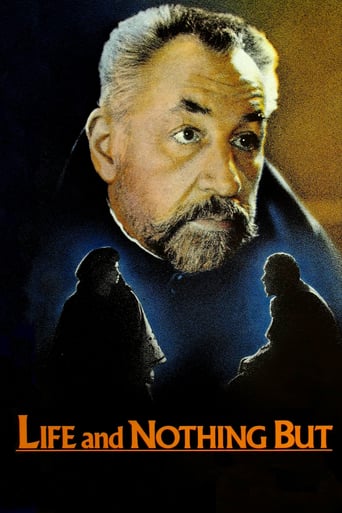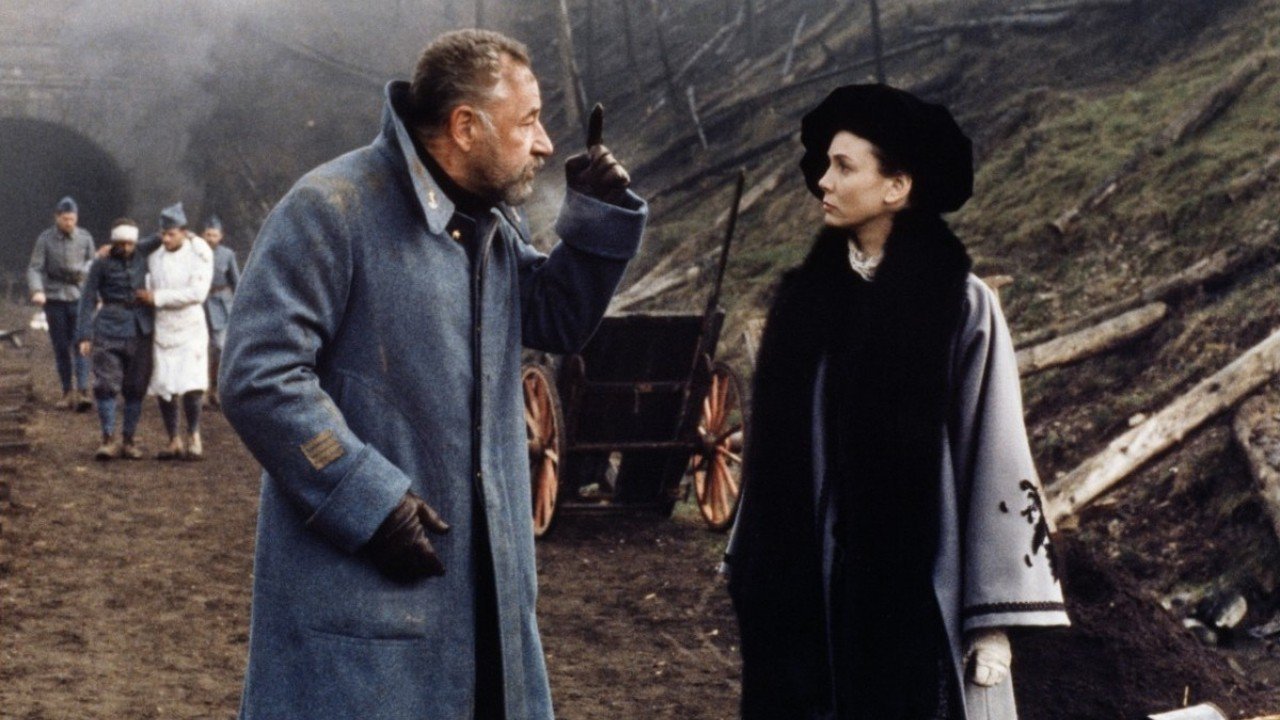jotix100
It is four years after the end of WWI and there are still bodies that are being found. The grim reality of gathering the mutilated remains of the soldiers that gave their lives in that conflict, is at the center of the story. Two women, Irene, an upper class Parisian, and Alice, a teacher, are looking desperately for a husband and a fiancé, both unaccounted for.The head of the MIA section of the French army, Major Delaplane, has seen enough horrors during his tour of duty. One thing comes clear, he is a man of integrity that is not interested in the politics that want to make a glorious example for the country trying to capitalize on the valor of the fallen men. Delaplane's superiors are more interested in bringing an unidentified soldier to be buried under the Arch of Triumph in Paris. He will stand for all men fallen in the different wars France has entered.At first, the bureaucratic Delaplane and the aristocrat Irene clash because he feels she wants to exert her class and connections in order to find the husband she wants to find. On the other hand, he is more sympathetic toward the poor Alice, a humble woman without pretensions. Through a twist of destiny, Irene and Alice, who bond in unexpected fashion, are closer than they know by the missing man.Bernard Tavernier is a director that always brings integrity to any project in which he presents on the screen. In this film, which he co-wrote with Jean Cosmos, an aspect of the war is looked at from a different perspective that is not dealt in many other anti-war films. In subtle ways Mr. Tavernier shows the viewer a side that most of us will never have to face. His Delaplane is a man that has seen horrors as he goes to the sites of recent battles to identify the dead, while his superiors are more interested in another aspect of the conflict that does not take into consideration the suffering the war causes on all the surviving members of the dead men.Any film with Philippe Noiret is worth taking a look. Mr. Noiret in his distinguished career humanized the characters he was asked to bring to life, as he does with his Deplane. The late actor shows an integrity in his Major Deplane that shows his affinity to the material. Sabine Azema, gives a nuanced performance as the rich Irene. Pascale Vignal is also effective as Alice. The vast supporting cast does excellent work for Mr. Tavernier.
Terrell-4
There are at least five stories in Life and Nothing But, and most of them could make a movie in themselves. There is the story of Major Delaplane (Philippe Noiret) who in 1920 has the task of trying to identify the 350,000 French soldiers who remain on the missing roles. There is the story of the hypocrisy behind the choosing of an unknown soldier who eventually will be buried with great pomp and honors beneath the Arc de Triomphe. There is the story of Irene de Courtil (Sabine Azema), married to a missing soldier who comes from a rich and privileged family. There is the story of Alice (Pascale Vignal) whose fiancée and lover was last seen in a battle where hundreds of soldiers were wounded or killed. And we have the story of the thousands of wives, parents, brothers and sisters of those 350,000 missing men who, nearly two years after the end of WWI, still have no idea of what happened to their men...are they alive, are they dead, are they horribly wounded, are they forgotten in some hospital or mental ward? Delaplane is an army officer who is consumed by his job of identifying the missing, of finding corpses and tracing who they were. His superiors think he is reckless and unreliable. The generals, the politicians and the industrialists want nothing more than to let the missing stay missing. That way bad decisions and pointless battles may escape notice, and protected factories can go back to business. Delaplane is even more cynical as he sees the rush to find the remains of an unidentified soldier to be honored in Paris. He has to deal with the aristocratic Madame de Courtil and with the schoolteacher, Alice. He is brusque and cynical, yet he is dedicated to finding and identifying every one of those 350,000 missing men that he possibly can. One long, outstanding sequence takes place in a huge, unstable railway tunnel. Toward the end of the war a train carrying munitions, gas shells, supplies and a car full of wounded soldiers entered the tunnel. The Germans in retreat had mined the place and it blew. Now, two years later and deep in the tunnel, Delaplane is trying to dig through the rubble, the unexploded gas shells and the torn tracks and find the car of bodies. In the field nearby relatives are waiting. Soldiers are sifting through dirt and rubble to find traces of bodies and belongings. Tables have been set up holding every manner of object which have been recovered so far, some matched with the bodies they were found on. People pass by the tables trying to find something that would tell them the fate of a loved one. They don't expect life; they just want closure. Tavernier holds these stories together thanks to the power of Philippe Noiret as Major Delaplane, to the power of outrage at what Delaplane is up against, and to a script which manages to combine sardonic humor with a look at what the bureaucracies of war do to the men who fight the wars. This is not a grim movie, but a poignant and sad one. "One patriotic song and off they go to war," says Irene de Courtil to Delaplane. They had been seated at a small restaurant where a black jazz band had been playing. Then a French woman came on stage and sang a song of how we can fight and then be comrades. The young soldiers all stood and joined in the song. So did Delaplane. "It's a club," she says fiercely to Delaplane. "It will be a club for years to come, this club of those who won the war. And the losing side will have its club, too. You know why I think of clubs? Because women aren't admitted! Nothing scares you men more than women, their wombs, their courage, their watching eyes..." And yet, as a friend and sculptor points out to Delaplane, the remains of the war now mean great business. "It's the Golden Age, my friend," he says. "Nothing like it since the Greeks, since the cathedrals. Even mediocre artists have their hands full. A monument per village. Three hundred sculptors for 35,000 towns. Everybody wants his doughboy, his widow, his pyramid, his marble, bas-reliefs, inscriptions. It's a factory. Better than the Renaissance. It's the resurrection." "Thanks to our dead," says Delaplane. Eventually the stories come together. The unknown soldier is selected with pomp and cynicism. Says Delaplane, "Officials are reassured by the story of the unknown soldier. They had a million and a half men killed, and now we'll only think about this one." Delaplane discovers the fate and identity of Irene's husband and Alice's lover. There are some twists and turnings. While each major character either chooses or is forced to choose life, the future for Delaplane and Irene is indefinite. On balance, while I liked this movie a lot, there still are probably too many things going on for Tavernier to handle with complete success. Still, it's always a satisfying experience to see Philippe Noiret, with those shrewd eyes and bloodhound eye lids, take on a role of real substance.
artzau
I take issue with some of the negative reviews regarding the storyline. It works. The superb acting of Noiret is better than usual and he's great when he's merely being ordinary. This is a powerful film about the nihilism following the end of la grande guerre. The character of Noiret, a man torn by complex emotional conditions identifying the unidentified, finds himself torn between his own moral code, his emerging love for a widow looking for her dead husband, his repulsion at the profiteering capitalism of industrialists and his secret knowledge of the dead man's bigamy. The intensity of Gallic emotions are often misunderstood by us Americans (too much English influence for my tastes, je suppose) but this is an excellent film with all the necessary elements for a classic. See it. Decide for yourself!
quincey-2
A wonderfully acted and well written drama set in France in the aftermath of World War One. It's a romance about the importance of memory in morality and love and coming to terms with loss on an individual and national scale.


 AD
AD
